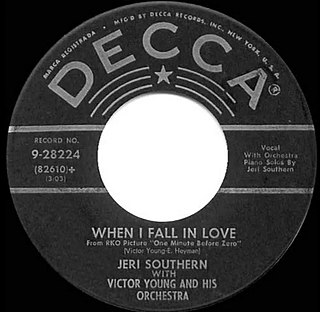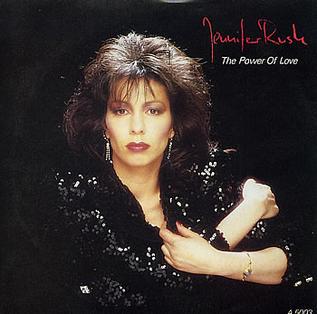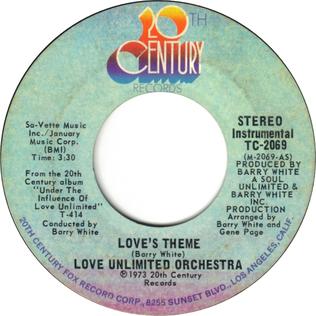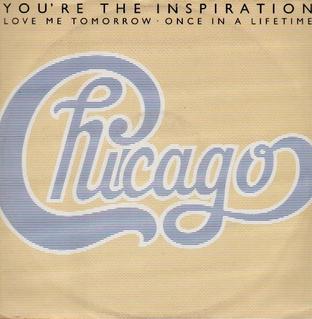Related Research Articles

"Take My Breath Away" is a song written by Giorgio Moroder and Tom Whitlock for the 1986 film Top Gun, performed by American new wave band Berlin. It won the Academy Award for Best Original Song, as well as the Golden Globe Award for Best Original Song in 1986.

"TSOP " is a 1974 hit recording by MFSB featuring vocals by The Three Degrees. A classic example of the Philadelphia soul genre, it was written by Gamble and Huff as the theme for the American musical television program Soul Train, which specialized in African American musical performers. The single was released on the Philadelphia International Records label. It was the first television theme song to reach number one on the Billboard Hot 100, and it is arguably the first disco song to reach that position.

John Stephen Parr is an English musician, singer, and songwriter, best known for his 1985 single "St. Elmo's Fire ", charting at number one in the US and number six in the UK, and for his 1984 US number-six rock single "Naughty Naughty". He has written and performed ten major motion-picture theme songs, including Three Men and a Baby and The Running Man. Parr has sold over 10 million albums and was nominated for a Grammy award for "St. Elmo's Fire" in 1985.

"When I Fall in Love" is a popular song, written by Victor Young (music) and Edward Heyman (lyrics). It was introduced in the film One Minute to Zero as the instrumental titled "Theme from One Minute to Zero". Jeri Southern sang on the first vocal recording released in April 1952 with the song's composer, Victor Young, handling the arranging and conducting duties. The song has become a standard, with many artists recording it; the first hit version was sung by Doris Day released in July 1952.

"Hard to Say I'm Sorry" is a power ballad written by bassist Peter Cetera, who also sang lead on the track, and producer David Foster, for the group Chicago. It was released on May 17, 1982, as the lead single from the album Chicago 16. On September 11 it reached No. 1 for two weeks on the Billboard Hot 100. It was the group's second No. 1 single. It was their first top 50 hit since "No Tell Lover" in 1978 and it spent twelve weeks in the top 5 of the Billboard Hot 100. The single was nominated for a Grammy Award for Best Pop Performance by a Duo or Group with Vocal, and was certified gold by the Recording Industry Association of America (RIAA) in September of the same year. Songwriter Cetera, a member of the American Society of Composers, Authors and Publishers (ASCAP), won an ASCAP Pop Music Award for the song in the category, Most Performed Songs.

"St. Elmo's Fire " is a song by British singer John Parr from the 1985 film St. Elmo's Fire. It hit #1 on the US Billboard Hot 100 chart on 7 September 1985, remaining there for two weeks. It was the main theme for Joel Schumacher's film, and first single from the soundtrack. The song was created and edited within 24 hours.

"The Power of Love" is a song co-written and originally recorded by American singer-songwriter Jennifer Rush in 1984. It was released as the fifth single from her debut album, Jennifer Rush (1984), and has since been covered by Air Supply, Laura Branigan and Celine Dion.

"The Prayer" is a song performed by Canadian singer Celine Dion and Italian tenor Andrea Bocelli. It was written by David Foster, Carole Bayer Sager, Alberto Testa and Tony Renis.

"That's All" is a song by English rock band Genesis. It is a group composition and appears as the second track on their 1983 album Genesis. It was the album's second single after "Mama". On June 17, 1993, MCA Records re-issued and re-released the song as a CD and "HiQ" cassette single.

"Baby, Come to Me", a love ballad from Patti Austin's 1981 album Every Home Should Have One, was her duet with James Ingram. It was written by Rod Temperton. The song was released as a single in April 1982, peaking at #73 on the Billboard Hot 100. Several months later, American soap opera General Hospital began to feature the song heavily as the love theme for character Luke Spencer. It was re-released in October and reached No. 1 on the chart in February 1983.

"These Dreams" is a song by American rock band Heart from their 1985 self-titled eighth studio album Heart. It was released on January 18, 1986, as the album's third single, becoming the band's first song to top the Billboard Hot 100. The single's B-side track, "Shell Shock", was also the B-side of Heart's previous single "Never".

"Glory of Love" is a 1986 song performed by Peter Cetera, which he wrote and composed with his then-wife Diane Nini and David Foster. The song was recorded by Cetera shortly after he left the band Chicago to pursue a solo career. Featured in the film The Karate Kid Part II (1986), it was Cetera's first hit single after he left the band, reaching number one on the Billboard Hot 100, and it was included on his album Solitude/Solitaire (1986), which Michael Omartian produced.

"Love's Theme" is an instrumental piece written by Barry White in around 1965. Recorded and released as a single by White's The Love Unlimited Orchestra in 1973, it was one of the few instrumental and purely orchestral singles to reach #1 on the Billboard Hot 100 chart in the United States, which it did in early 1974. Billboard ranked it as the #3 song for 1974.

"Theme from S.W.A.T." is an instrumental song written by Barry De Vorzon and performed by American funk group Rhythm Heritage, released on their debut album Disco-Fied. It reached number one on the Billboard Hot 100 singles chart in the United States on the chart date of February 28, 1976.

David Foster is a self-titled solo album by David Foster, released in 1986. The album is mainly instrumental with two duet-style songs featuring rare vocals from Foster himself. This work led to Foster receiving the Juno Award for "Instrumental Artist of the Year" in 1986 and 1987, and a Grammy Award nomination for "Best Pop Instrumental Performance" in 1986. Co-producer Humberto Gatica was also nominated for a Grammy Award in 1986 for "Best Engineered Recording" for this album.

"Hard Habit to Break" is a song written by Steve Kipner and John Lewis Parker, produced and arranged by David Foster and recorded by the group Chicago for their 1984 album Chicago 17, with Bill Champlin and Peter Cetera sharing lead vocals. Released as the second single from the album, it reached No. 3 on the Billboard Hot 100 and was prevented from charting higher by "Caribbean Queen" by Billy Ocean and "I Just Called to Say I Love You" by Stevie Wonder. "Hard Habit to Break" also peaked at No. 3 on the Adult Contemporary chart. Overseas it peaked at No. 8 on the UK Singles Chart.

"You're the Inspiration" is a song written by Peter Cetera and David Foster for the group Chicago and recorded for their fourteenth studio album Chicago 17 (1984), with Cetera singing lead vocals. The third single released from that album, it reached No. 3 on the US Billboard Hot 100 chart in January 1985 and also climbed to the top position on the Adult Contemporary chart at the same time. The song won honors for Cetera from the American Society of Composers, Authors and Publishers (ASCAP), in 1986 in the most-performed songs category.

"Friends and Lovers" is a song written by Jay Gruska and Paul Gordon. The song was first recorded as a duet by Gloria Loring and Carl Anderson in 1985 for the soap opera Days of Our Lives, produced by Doug Lenier. That recording remained unreleased until the summer of 1986, when it was released shortly after a version by Juice Newton and Eddie Rabbitt hit country radio. The country version featured the altered title of "Both to Each Other ".

"Wildflower" is a song written by Doug Edwards and Dave Richardson in 1972. First performed by the Canadian band Skylark, it has been covered by many artists and more recently has been sampled in a number of hip hop songs.

"We Don't Need Another Hero (Thunderdome)" is a 1985 song by American singer and actress Tina Turner. It appeared in the 1985 film Mad Max Beyond Thunderdome, which starred Turner and Mel Gibson, and is written by Terry Britten and Graham Lyle. On the heels of Turner's multiplatinum album Private Dancer, the song was released as a 7" single, an extended version was released as a 12" single and on the film's soundtrack album. In the UK, a shaped picture disc was also released. The power ballad received a Golden Globe nomination for Best Original Song and a Grammy nomination for Best Female Pop Vocal Performance in 1986. As songwriters, Lyle and Britten received the 1985 Ivor Novello award for Best Song Musically and Lyrically.
References
- 1 2 "National Top 100 Singles for 1986". Kent Music Report . No. 650. December 1986. Retrieved January 24, 2023– via Imgur.
- ↑ "David Foster Chart History (Hot 100)". Billboard.
- ↑ "David Foster Chart History (Adult Contemporary)". Billboard.